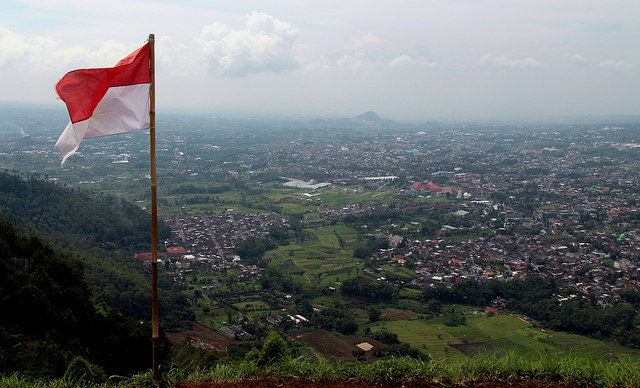ASEAN and Indonesia’s foreign policy: 50 years on
Posted By Ristian Atriandi Supriyanto on August 31, 2017 @ 14:30

In his speech [1] commemorating ASEAN’s 50th birthday, Indonesia’s President Joko Widodo reminded ASEAN to maintain its unity and centrality lest it be drawn deeper into a great-power rivalry that would undermine the security of individual member states. Indeed, the threat of great-power rivalry in Southeast Asia strongly motivated Indonesia to establish ASEAN with Malaysia, the Philippines, Singapore and Thailand in August 1967. Fifty years later, a similar threat has returned amid nagging doubts [2] that Indonesia can mitigate it through ASEAN.
In 1967, the Cold War was ‘hot’ with the American war in Vietnam. Meanwhile, Indonesia had just ended its bellicose Konfrontasi [3] (Confrontation) policy against the British-backed Malaysia and Singapore. Those events coincided with the rise to power in Jakarta of the anti-communist General Suharto, who made economic recovery a priority after years of mismanagement and neglect under his predecessor, the leftist President Sukarno.
Yet, suspicion towards the great powers’ military presence in Southeast Asia remained as strong a feature of Suharto’s foreign policy as it had been under Sukarno. With America’s military presence in Thailand and the Philippines, and Britain’s in Malaysia and Singapore, Suharto was very much aware of the acute sensitivities Indonesians felt against an immediate volte-face from Sukarno’s firm anti-imperialism legacy. Indonesia’s abandonment of Konfrontasi thus entailed a commitment [4] by all ASEAN members to ensure that ‘all foreign bases [on their soil] are temporary’ and ‘are not intended to be used directly or indirectly to subvert national independence and freedom of States in the area or prejudice … their national development.’
In 1971, ASEAN agreed [5] to a ‘neutralisation’ of Southeast Asia, promising a region ‘free from any form or manner of interference by outside Powers’. In addition, ASEAN pledged [6] its members to the principle of ‘non-interference in internal affairs of one another’ so that they could concentrate on the paramount concerns of internal (regime) security, political consolidation and economic development.
In the following decades, ASEAN became the cornerstone of Indonesia’s foreign policy, with the primary aim of keeping the great powers at bay, such as during the Cambodian conflict [7]. Indonesia initially hesitated to see ASEAN denouncing Vietnam for invading and occupying Cambodia in 1978, for Hanoi had been a strategic buffer against possible Chinese expansion into mainland Southeast Asia. Yet, the consequences of Vietnam’s free rein in Cambodia would have been worse. It would have given Vietnam’s ally, the Soviet Union, greater influence over the region, exposed Thailand’s eastern flank to Vietnamese incursions, and in turn compelled Bangkok to ask its ally, the United States, if not also Vietnam’s arch-rival, China, for more military assistance and presence. In short, a mere slap on Hanoi’s wrist would have failed to stop further militarisation and destabilisation of Southeast Asia by the great powers.
The fall of Suharto in May 1998 and the subsequent democratisation [8] of Indonesia’s national politics opened its foreign policy up to the scrutiny of multiple domestic stakeholders. Now the legislature and civil society demand a greater say, if not also a veto, in the making of foreign-policy decisions.
However, the current increase in foreign-policy stakeholders coincides with the return of great-power rivalry reminiscent of the 1960s and 1970s. It has become harder for Indonesia, let alone ASEAN, to answer critical geopolitical questions, such as the South China Sea dispute [9], with clarity and one voice. Compounding that problem is the wider diversity of ASEAN’s membership. The process of managing intractable geopolitical issues is becoming more complex. The ‘ASEAN way [10]’ of consensus decision-making to address such issues means that collective decisions are about finding the lowest common denominator. ASEAN’s difficulty in issuing joint communiqués on contentious geopolitical issues, if at all, could become the norm.
As ASEAN finds it increasingly difficult to conceal internal discord, its unity and centrality are slipping away. ASEAN has now come under the scrutiny of great powers whose rivalries it originally meant to keep at bay. It’s axiomatic that ASEAN’s relevance today is contingent upon its members’ ability to avoid becoming the proxies [11] of such rivalries. There have been calls for Jakarta to contemplate a ‘post-ASEAN foreign policy [12]’, introduce ASEAN-minus-X or voting mechanisms, or focus on alternative multilateral groupings that can better fit Indonesia’s strategic preferences. In a way, those suggestions reflect Indonesia’s increasingly pragmatic [13] and transactional [14] view of ASEAN.
Fifty years ago, ASEAN was founded to promote regional stability, which was vital for Indonesia’s national development. Now, the reverse seems to apply: national development is the basis [15] for ASEAN’s relevancy. Jakarta appears less hesitant to look elsewhere for whatever ASEAN fails to deliver.
It would be a real concern [16] if Jakarta felt it could get more out of the great powers than out of ASEAN. If that happened, any conflict [17] of interest among and between the great powers and ASEAN would compel a serious rethink of Indonesia’s foreign policy. The challenge thus lies in how Jakarta can help ASEAN innovate and evolve so that it can reconcile the changing expectations of member states in light of the great-power rivalry [18] in Asia.
Article printed from The Strategist: https://www.aspistrategist.org.au
URL to article: https://www.aspistrategist.org.au/asean-indonesias-foreign-policy-50-years/
URLs in this post:
[1] speech: http://setkab.go.id/sambutan-presiden-joko-widodo-pada-peringatan-50-tahun-asean-tahun-2017-di-asean-hall-sekretariat-asean-jakarta-selatan-jumat-11-agustus-2017-pukul-10-30-wib/
[2] doubts: https://www.iseas.edu.sg/images/pdf/TRS12_16.pdf
[3] Konfrontasi: https://www.aspistrategist.org.au/australia-indonesia-and-confrontation/
[4] commitment: http://asean.org/the-asean-declaration-bangkok-declaration-bangkok-8-august-1967/
[5] agreed: http://treaty.kemlu.go.id/uploads-pub/5079_ASEAN-1971-0005.pdf
[6] pledged: http://asean.org/treaty-amity-cooperation-southeast-asia-indonesia-24-february-1976/
[7] conflict: http://www.tandfonline.com/doi/abs/10.1080/10357719308445107?journalCode=caji20
[8] democratisation: http://etheses.lse.ac.uk/992/
[9] dispute: https://muse.jhu.edu/article/647376
[10] ASEAN way: http://www.straitstimes.com/opinion/asean-integration-remains-an-illusion
[11] proxies: http://nasional.kompas.com/read/2017/04/25/21002191/50.tahun.asean
[12] post-ASEAN foreign policy: http://www.thejakartapost.com/news/2009/06/30/indonesia-needs-a-postasean-foreign-policy.html
[13] pragmatic: http://www.internationalaffairs.org.au/australianoutlook/asean-indonesia-under-jokowi/
[14] transactional: http://www.thejakartapost.com/news/2014/11/13/jokowi-demands-fair-trade.html
[15] basis: http://jakartaglobe.id/news/experts-agree-importance-asean-jokowis-developing-foreign-policy/
[16] concern: http://www.nationmultimedia.com/opinion/Jokowi-preparing-Indonesia-for-role-beyond-Asean-30251598.html
[17] conflict: http://www.lse.ac.uk/ideas/Assets/Documents/reports/LSE-IDEAS-New-Geopolitics-of-Southeast-Asia.pdf
[18] rivalry: http://www.eastasiaforum.org/2015/10/04/asean-can-survive-great-power-rivalry-in-asia/
Click here to print.